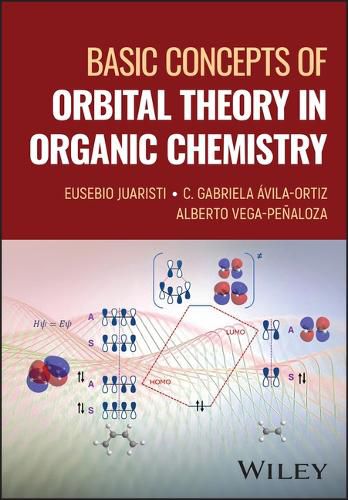Readings Newsletter
Become a Readings Member to make your shopping experience even easier.
Sign in or sign up for free!
You’re not far away from qualifying for FREE standard shipping within Australia
You’ve qualified for FREE standard shipping within Australia
The cart is loading…






Increase your understanding of molecular properties and reactions with this accessible textbook
The study of organic chemistry hinges on an understanding and capacity to predict molecular properties and reactions. Molecular Orbital Theory is a model grounded in quantum mechanics deployed by chemists to describe electron organization within a chemical structure. It unlocks some of the most prevalent reactions in organic chemistry.
Basic Concepts of Orbital Theory in Organic Chemistry provides a concise, accessible overview of this theory and its applications. Beginning with fundamental concepts such as the shape and relative energy of atomic orbitals, it proceeds to describe the way these orbitals combine to form molecular orbitals, with important ramifications for molecular properties. The result is a work which helps students and readers move beyond localized bonding models and achieve a greater understanding of organic chemical interactions.
In Basic Concepts of Orbital Theory in Organic Chemistry readers will also find:
Comprehensive explorations of stereoelectronic interactions and sigmatropic, cheletropic, and electrocyclic reactions, Detailed discussions of hybrid orbitals, bond formation in atomic orbitals, the Hueckel Molecular Orbital Method, and the conservation of molecular orbital symmetry Sample exercises for organic chemistry students to help reinforce and retain essential concepts
Basic Concepts of Orbital Theory in Organic Chemistry is ideal for advanced undergraduate and graduate students in chemistry, particularly organic chemistry.
$9.00 standard shipping within Australia
FREE standard shipping within Australia for orders over $100.00
Express & International shipping calculated at checkout
Increase your understanding of molecular properties and reactions with this accessible textbook
The study of organic chemistry hinges on an understanding and capacity to predict molecular properties and reactions. Molecular Orbital Theory is a model grounded in quantum mechanics deployed by chemists to describe electron organization within a chemical structure. It unlocks some of the most prevalent reactions in organic chemistry.
Basic Concepts of Orbital Theory in Organic Chemistry provides a concise, accessible overview of this theory and its applications. Beginning with fundamental concepts such as the shape and relative energy of atomic orbitals, it proceeds to describe the way these orbitals combine to form molecular orbitals, with important ramifications for molecular properties. The result is a work which helps students and readers move beyond localized bonding models and achieve a greater understanding of organic chemical interactions.
In Basic Concepts of Orbital Theory in Organic Chemistry readers will also find:
Comprehensive explorations of stereoelectronic interactions and sigmatropic, cheletropic, and electrocyclic reactions, Detailed discussions of hybrid orbitals, bond formation in atomic orbitals, the Hueckel Molecular Orbital Method, and the conservation of molecular orbital symmetry Sample exercises for organic chemistry students to help reinforce and retain essential concepts
Basic Concepts of Orbital Theory in Organic Chemistry is ideal for advanced undergraduate and graduate students in chemistry, particularly organic chemistry.